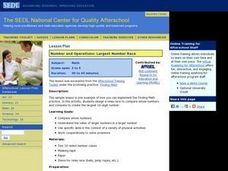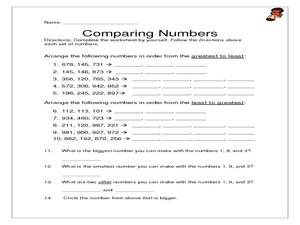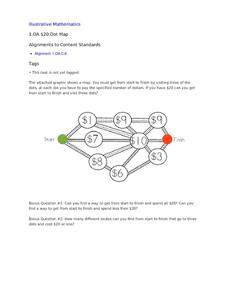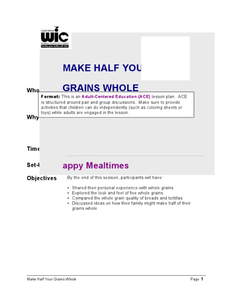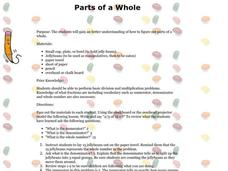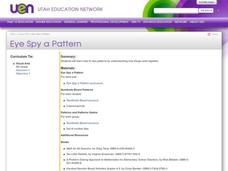Curated OER
To Be (Half) Or Not To Be (Half)
First graders demonstrate various ways to represent and verify a whole or set separated in two, three, or four equal parts. Using interlocking cubes, Students model a part of a whole or a part of a set. They use appropriate tools and...
Curated OER
Technology Lesson Activity: Fractions
Fifth graders practice using the English measuring system by creating fractions. In this parts of a whole lesson, 5th graders combine math key bars to simulate small parts of a bigger item. Students combine the pieces to...
Curated OER
Little Mouse, the Red Ripe Strawberry and Big Hungry Bear Lesson Plan
Students create a fruit salad using pieces of fruit cut in halves. In this early childhood lesson plan, students discover the concept of half and whole. Students experience this concept in a hands-on activity in which they cut fruit...
Curated OER
How Many Ways Can You Represent a Number?
Students participate in monthly scaffolded lessons that focus on working with whole numbers from 1 to 10. They work with tiles on exploration mats, number tile mats, and a number representation book. Each month they complete activities...
Curated OER
Addition/Subtraction Strategies
Third graders recall all their addition and subtraction facts to 20. They use the relevant number strategy with whole numbers. Students are taught place value in relation to decimals, and identify 'which decimal is larger.' They...
Curated OER
Number and Operations- Largest Number Race
Students participate in a race to compare whole numbers. In this number operations lesson, students create the largest 10-digit number and discuss how they constructed the largest number.
Curated OER
Finding PI
Students select and use appropriate operations, methods and tools to compute or estimate using whole numbers. They develop and use formulas for determining the circumference and area of circles. Students determine and describe the...
Curated OER
Number and Operations: Webbing Our Way Through Numbers
Second graders explore estimation and place value. For this place value lesson, 2nd graders estimate and construct numbers while working with spider activities. Students use addition and subtraction to compare estimates. Resources and...
Curated OER
Arranging Numbers in order up to 1,000
Third graders arrange numbers up to 1,000. In this arranging numbers instructional activity, 3rd graders play a game to try and build the biggest number they can using number tiles. Students work in groups to draw number tiles from...
Curated OER
Mystery Stars: Estimating Whole Numbers Using Fractions Shown on Sectors of a Circle
In this set of fraction worksheets, students cut out 6 pages of circles that show fractions with stars covering different sections of circles. They show one section of the circle in order to estimate the whole number of stars by looking...
Curated OER
Arranging Numbers from 1 to 5
Kindergarteners arrange manipulatives or everyday objects in groups of one through five. They identify groups seen in pictures of nature and compare same numbers of different objects.
Curated OER
Counting Numbers 0-30
Here are some fun and simple ways to practice counting, saying, and writing numbers 0-5. First, play a whole-class game: scholars sit in a circle and count off around the circle. The player after the number five has been called has to...
Curated OER
Real Numbers in the Real World
Delve into the concept of operating on the set of real numbers! In this operating with the set of real numbers lesson, pupils perform order of operations on the set of real numbers using a calculator.
Curated OER
Problem Solvers
Fifth and sixth graders compare decimals to the place-value structure in the base-ten number system. They represent fractions as parts of unit wholes, as parts of a set, as locations on a number line, and as divisions of whole numbers....
Illustrative Mathematics
$20 Dot Map
Challenge the addition skills of young learners with this open-ended math problem. The task is simple, get from start to finish by connecting a series of three numbers. The trick is that the sum of the numbers must be less than...
Illustrative Mathematics
Start/Stop Counting II
Take stroll around the classroom while teaching young mathematicians to count fluently with this whole-group math activity. The teacher starts things off by walking around the room while counting up from the number one and continues...
Curated OER
How Many?
Establish 1:1 correspondence by counting students, first one gender, then the other. Give each child a colored cube (one color for boys, another for girls) and have small groups determine more or less and how many all together. As a...
Virginia Department of Education
Integers: Addition and Subtraction
Young mathematicians construct their own understanding of integers with an inquiry-based math lesson. Using colored chips to represent positive and negative numbers, children model a series of addition and subtraction problems as...
Curated OER
Make Half Your Grains Whole
Students discuss the benefits of eating whole grains. In this adult health lesson, students compare samples of whole grain food products. They recommend ways on how to incorporate whole grains in their family diet.
Curated OER
Compare and Arrange Whole Numbers Up to 100
Number whizzes investigate integers by arranging them in a specific order. They utilize whole numbers which are given to them and then put them in order up to 100. They also practice using "greater than" or "lesser than" symbols.
Curated OER
Parts of a Whole
Students gain an better understanding of how to figure out parts of a whole.
Curated OER
Place Value for Whole Numbers
Fourth graders, in groups, explore place value for whole numbers. They explore how to use base-ten materials to make sense of place value in the tens and ones column. They also explore whole-number patterns by using base-ten materials.
Curated OER
Eye Spy a Pattern
Fifth graders examine how to see patterns by showing how things work together. They identify, analyze and determine a rule for predicting and extending numberical patterns involving operations of whole numbers, decimals and fractions.
Curated OER
Corn Field Math
Middle schoolers complete problems dealing with whole numbers, fractions and percents. After exploring the history of corn and related farming vocabulary, students work in pairs to solve multi-step problems. They incorporate the use of...
Other popular searches
- Rounding Whole Numbers
- Fractional Parts of a Whole
- Parts of a Whole
- Whole Number Computation
- Fractional Parts to Whole
- Whole Truth
- Adding Whole Numbers
- Comparing Whole Numbers
- Multiply Whole Numbers
- Multiplying Whole Numbers
- Dividing Whole Numbers
- Whole Number Patterns





